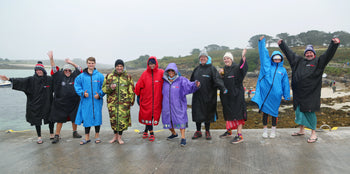6 Minuten Lesezeit
One of our favourite festive traditions is taking the plunge and getting in the water over Christmas and New Year! Whether that’s throwing on fancy dress for charity, or just jumping in the freezing water with your friends and family, thousands of swimmers all around the UK and Ireland brave the cold and take part in a festive dip.
There are hundreds of events that regularly take place around this time of year all over the country, including the Porthcawl Christmas Day Swim, the Loony Dook on News Years Day in Edinburgh, The Forty Foot Christmas Day Swim in Dublin, the New Year’s Day ‘Dip for Clic’ in Newquay, and many, many more.

Not only is this a fun and exhilarating way to celebrate Christmas or ring in the New Year, but there are also huge physical and mental health benefits. Outdoor swimming and cold-water immersion have been shown to help to reduce anxiety, improve circulation, boost your mood and help you to connect with nature.
Whether you’re an experienced festive dipper or planning to give it a go for the first time check out these tips for staying safe and how to cope with the chilly water...

How to stay safe?
Whilst the festive dips are all about having fun, it’s still essential to always respect the water. A lot of these swims now are large, organised events with their own safety procedures in place, but many are much looser and smaller, so it’s really important that you are prepared for the risks involved.
We spoke to our partners at RLSS UK about staying safe when taking part in festive dips and they gave us their advice for anyone looking to get in the water:
- Find an organised event – some of these swims are now quite large, but many are much smaller but we recommend finding an organised event to make sure everything is managed correctly
- Make sure you go with a group – never go alone and stay with those you are with to stay safe
- Tell someone where you are going and how long you intend to be
- Make sure you have the right equipment to enter the water
- Take warm, dry clothes to change into including hats, gloves, socks and even a dryrobe and be sure to change in a sheltered place
- Take food and a flask with a warm drink to re-fuel and warm up after your swim
If you haven’t been for a winter dip before we have a great cold water exposure plan to help you prepare for your winter dip. Take a look at our 2 week exposure plan, Sponge to Plunge.
If you are planning a winter dip over the festive period, we hope you enjoy your experience of open water swimming and follow our tips above to stay safe.
How do I cope with the cold water?
The question most people ask when preparing for a festive dip is “How will I deal with the cold!!!”. Olympic open water swimmer and dryrobe® Ambassador Keri-anne Payne shares her expert advice for swimming in cold water:

Be prepared. This includes having all the kit you need before, during, and after your swim. Here's my kit list:
-
Swimsuit
-
Swim hat
-
Goggles
-
Woolly hat
-
Booties
-
Gloves
-
Warm drink
-
dryrobe® Advance change robe
Be ready for the cold shock. When immersing in cold water, our bodies have a natural shock reaction that sends our bodies into panic mode - think fight or flight. The specifics of cold shock panic include shortness of breath, so the best way to overcome this is through breathing - specifically breathing out.
Run through a few rounds of breathing, breathing in for a count of 4 and out for a count of 6/8. This will help to switch the cortisol to endorphins - it is the trigger for people to feel euphoric when they get out from a cold water swim.

Get acclimatised. A common feeling I hear from people that do cold water swimming is that they just can't put their face under because of the 'ice-cream' headache feeling.
There isn't a magic cure here I'm afraid, it's just a barrier we need to push through. Just like when you first get in, your legs feel on fire and after a few minutes you feel better - the same needs to happen with your head. The more you put it in the water the quicker you push past the 'acclimatisation' of your head.

Always get out wanting more. When I go swimming and get to the point where I'm thinking to myself ‘This is amazing!', after the initial shock, I get out. It's always better to be safe than sorry. Also, this gives me the best chance to really understand how my body reacts to the cold and I have started to learn more about how long I can stay in for.
Wrap up and enjoy a warm drink. One of the reasons I also get out when I start to enjoy myself is because I know that the shivers are coming! The shivering process requires us to have some energy in our system, so a nice warm hot chocolate or sugary coffee will be the best thing to feel a bit of comfort post-swim but also to fuel the shivering process.
Shivering is a good thing, it's our body’s natural way to warm up if we are cold. So, I usually want to make sure I am dressed before I start uncontrollably shivering. I also always make sure I have my dryrobe®, not only because it's SO warm, but because it's so easy to get dressed under.

Wherever you end up doing your festive dip this year we’d love to see what you get up to. Tag your photos on social media with @dryrobe and #dryrobeterritory. Stay safe and have fun!!
